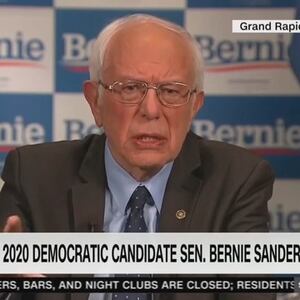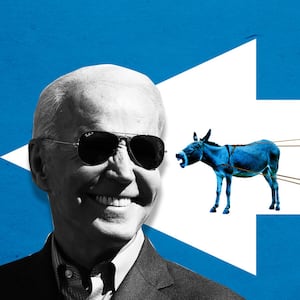A 2016 win in Michigan helped save Sen. Bernie Sanders’ (I-VT) presidential campaign. Now the state may prove to be his undoing.
Michigan Democratic primary voters sided with former Vice President Joe Biden on Tuesday, giving the former vice president a major win in the Midwest and dealing a devastating blow to Sanders’ chances of wrestling back control of the nomination fight.
Sanders’ narrow victory over former Secretary of State Hillary Clinton in Michigan’s 2016 primary battle proved to be a major upset for the Vermont senator. His inability to win the state this time around could be the nail in the coffin for his campaign, coming as the Associated Press called Mississippi and Missouri for Biden earlier on Tuesday evening. Though not delegate heavy, Biden’s victory in Idaho late Tuesday night only added to a strong night for the Democratic frontrunner.
The Missouri victory was also a tough blow for Sanders, who nearly won the state during his 2016 primary campaign, losing to Clinton by just .25 percent once the votes were tallied.
And before the night had ended, top officials in the Democratic Party were already making the case that the primary had ended for all intents and purposes.
“We have been studiously neutral for 15 months and were preparing for a Sanders nomination just 10 days ago but we should just call this what it is,” said Guy Cecil, head of the party’s largest super PAC, Priorities USA. “We don’t have time, money, or energy to spare.”
Despite Biden’s strong night, Sanders and his supporters were able to claim a late breaking victory in North Dakota.
Tuesday’s set of primaries, six in total, comes at a tense time across the United States. Fears about the novel coronavirus and concerns about its impact was the backdrop for a day where Michigan, Missouri, Idaho, North Dakota, Washington, and Mississippi all cast ballots.
Both Biden and Sanders canceled campaign events scheduled to be held in Ohio Tuesday night hours after the governor called a state of emergency relating to the virus. Sanders didn’t speak at all on Tuesday night while Biden calmly addressed a crowd in Philadelphia—home of his campaign headquarters—saying that while there was a way to go “it looks like we’re going to have another good night.”
The last minute logistics deprived the frontrunner of an audience proportional to his Tuesday night victory. As Biden drew closer to the Democratic nomination, he had no packed hall of fans or even a stage. Instead, he walked out to a dais on a flag-strewn balcony with cameras, a dais, and a small ring of supporters.
“And I want to thank Bernie Sanders and his supporters for their tireless energy and their passion,” Biden said. “We share a common goal and together we’ll defeat Donald Trump. We'll defeat him together.”
For Sanders, in particular, it’s a tough time to be off the trail. His electoral stock has fallen at the expense of Biden’s rise. Before South Carolina, Sanders had established himself as the Democratic frontrunner, powered by success in Iowa and clear victories in the New Hampshire and Nevada contests.
But South Carolina, where Sanders had hoped to recover from a blowout loss in the 2016 cycle, overwhelmingly sided with Biden and soon two of Biden’s rivals—first former South Bend mayor Pete Buttigieg and then Sen. Amy Klobuchar (D-MN)—dropped out of the race and, within days, endorsed the former VP. On Sunday, former Rep. Beto O’Rourke (D-TX), who dropped out of the presidential race months ago, joined Biden and Klobuchar at a rally in his home state of Texas to also endorse Biden ahead of the crucial Super Tuesday contest.
Whether it was the show of unity or the momentum from South Carolina or some combination of the two, Biden exceeded expectations on Super Tuesday, beating Sanders in ten of the 14 contests, including surprise victories in Minnesota and Texas. Biden came into Tuesday night’s contests with 670 delegates, according to The Associated Press, while Sanders had won 574.
The groundswell of support and the wave of endorsements allowed the Biden campaign to deploy the younger generation of elected officials on the trail. Klobuchar boosted Biden at events last weekend. Sen. Kamala Harris (D-CA), who endorsed Biden on Sunday, campaigned alongside him in Detroit on Monday night and was joined by fellow newfound Biden supporter Sen. Cory Booker (D-NJ).
Few endorsements have gone Sanders way since Super Tuesday, though Jesse Jackson announced his support for the Vermont Independent on Sunday and the Working Families Party also came to Sanders aid with an endorsement Monday morning. Sen. Elizabeth Warren (D-MA) drew some Sanders supporters ire by not dropping out before Super Tuesday, and then further irking them by not endorsing Sanders once she formally ended her campaign last week.
Sanders now faces a crucial week ahead. A Democratic debate, albeit one without a live audience, is scheduled for Sunday night in Phoenix. Then Ohio, Florida, Illinois, and Arizona will all vote on March 17. During his 2016 run, Sanders did not win any of those states.
The newly widened delegate gap also puts Biden in a delicate spot: with his frontrunner status solidified, he’s likely to face questions centered around the general election he has in store for President Donald Trump. The president has made it a personal priority to attack Biden, usually on personal fronts. And after his success in Michigan, the state Trump unexpectedly won over Clinton four years ago, he’s likely to ramp up efforts.
—With reporting by Sam Stein, Hanna Trudo and Adam Rawnsley








